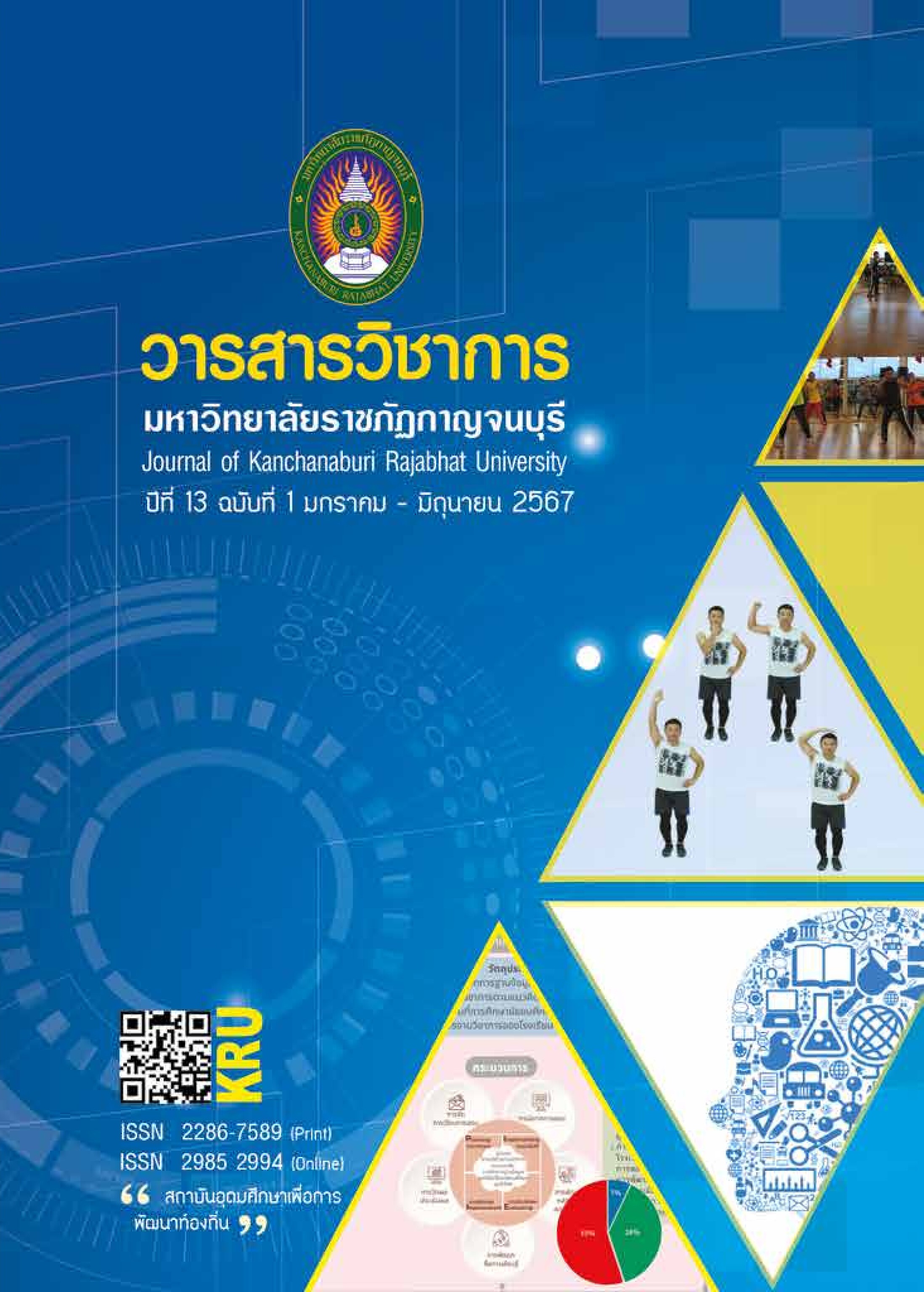การพัฒนารูปแบบการบริหารงานวิชาการตามแนวคิดการจัดการฐานข้อมูลของโรงเรียนมัธยมศึกษายุคดิจิทัล
Main Article Content
บทคัดย่อ
การวิจัยนี้ มีวัตถุประสงค์เพื่อ (1) ศึกษาองค์ประกอบรูปแบบการบริหารงานวิชาการตามแนวคิดการจัดการฐานข้อมูลของโรงเรียนมัธยมศึกษายุคดิจิทัล (2) พัฒนารูปแบบการบริหารงานวิชาการตามแนวคิดการจัดการฐานข้อมูลของโรงเรียนมัธยมศึกษายุคดิจิทัล และ (3) ประเมินความเหมาะสมของรูปแบบการบริหารงานวิชาการตามแนวคิดการจัดการฐานข้อมูลของโรงเรียนมัธยมศึกษายุคดิจิทัล โดยเป็นการวิจัยแบบผสานวิธี แบ่งออกเป็น 3 ระยะ ดังนี้ ระยะที่ 1 ศึกษาองค์ประกอบรูปแบบการบริหารงานวิชาการตามแนวคิดการจัดการฐานข้อมูลของโรงเรียนมัธยมศึกษายุคดิจิทัล ตามแนวคิดการจัดการฐานข้อมูล กลุ่มตัวอย่างได้แก่ โรงเรียนมัธยมศึกษา สำนักงานคณะกรรมการการศึกษาขั้นพื้นฐาน จำนวน 210 โรงเรียน ผู้ให้ข้อมูลได้แก่ ผู้บริหารโรงเรียน รองฝ่ายวิชาการ/หัวหน้ากลุ่มงานวิชาการ และหัวหน้างานสารสนเทศ จำนวน 630 คน ได้มาโดยการสุ่มแบบแบ่งชั้นสัดส่วนกระจายตามโรงเรียน เก็บรวบรวมข้อมูล โดยใช้แบบสอบถาม สถิติที่ใช้ในการวิเคราะห์ข้อมูล โดยการหาค่าความถี่ ร้อยละ ค่าเฉลี่ย ส่วนเบี่ยงเบนมาตรฐาน และการวิเคราะห์องค์ประกอบเชิงยืนยัน ระยะที่ 2 พัฒนารูปแบบการบริหารงานวิชาการตามแนวคิดการจัดการฐานข้อมูลของโรงเรียนมัธยมศึกษายุคดิจิทัล โดยใช้การสัมภาษณ์กลุ่มตัวอย่างในโรงเรียนที่ได้รับรางวัลการปฏิบัติที่เป็นเลิศ ด้านการบริหารงานวิชาการและการจัดฐานข้อมูลในโรงเรียน ประกอบด้วย ผู้บริหารโรงเรียน รองฝ่ายวิชาการ/หัวหน้ากลุ่มงานวิชาการ และหัวหน้างานสารสนเทศ จำนวน 9 ท่าน โดยการเลือกแบบเจาะจง ระยะที่ 3 ประเมินเหมาะสมของรูปแบบการจัดการฐานข้อมูลเพื่อการบริหารงานวิชาการของโรงเรียนมัธยมศึกษายุคดิจิทัล ผู้ให้ข้อมูลได้แก่ ผู้บริหารโรงเรียน รองฝ่ายวิชาการ/หัวหน้ากลุ่มงานวิชาการ และหัวหน้างานสารสนเทศ จำนวน 9 ท่าน โดยการเลือกแบบเจาะจง เก็บรวบรวมโดยการสัมมนากลุ่มผู้เชี่ยวชาญ และการวิเคราะห์เนื้อหา
ผลการวิจัยพบว่า
ผลการพัฒนารูปแบบการบริหารงานวิชาการตามแนวคิดการจัดการฐานข้อมูลของโรงเรียนมัธยมศึกษายุคดิจิทัล รูปแบบ ประกอบด้วย 1) หลักการของรูปแบบ 2) เป้าหมายและวัตถุประสงค์ของรูปแบบ 3) กระบวนการบริหารงานวิชาการตามแนวคิดการจัดการฐานข้อมูลของโรงเรียนมัธยมศึกษายุคดิจิทัล ประกอบด้วย 3.1 การวางแผนการพัฒนาฐานข้อมูลบริหารงานวิชาการ 3.2 การปฏิบัติตามแผนการพัฒนาฐานข้อมูลบริหารงานวิชาการ 3.3 การติดตามแผนการพัฒนาฐานข้อมูลบริหารงานวิชาการ 3.4 การวัดและประเมินผลการพัฒนาฐานข้อมูลบริหารงานวิชาการ และ 4) ผลลัพธ์ที่เกิดขึ้น
รูปแบบการบริหารงานวิชาการตามแนวคิดการจัดการฐานข้อมูลของโรงเรียนมัธยมศึกษายุคดิจิทัล ผู้เชี่ยวชาญมีฉันทามติในรูปแบบการบริหารงานวิชาการตามแนวคิดการจัดการฐานข้อมูลของโรงเรียนมัธยมศึกษายุคดิจิทัล และมีความถูกต้อง เหมาะสม เป็นไปได้ และนำไปใช้ได้จริง ในระดับมากที่สุด
Article Details

อนุญาตภายใต้เงื่อนไข Creative Commons Attribution-NonCommercial-NoDerivatives 4.0 International License.
เอกสารอ้างอิง
กระทรวงศึกษาธิการ. (2560). แผนการศึกษาแห่งชาติ พ.ศ. 2560 - 2579 (พิมพ์ครั้งที่ 1) . กรุงเทพฯ : พริกหวานกราฟฟิค.
ปาริชาติ ชมชื่น. (2555). รูปแบบการบริหารงานวิชาการแบบมีส่วนร่วมของชุมชนที่มี ประสิทธิผลในสถานศึกษาสังกัดสํานักงานเขตพื้นที่การศึกษาประถมศึกษา.
วิทยานิพนธ์ครุศาสตรดุษฎีบัณฑิต สาขาผู้นำการบริหารการศึกษา บัณฑิตวิทยาลัย มหาวิทยาลัยราชภัฏอุบลราชธานี.
ระวี จันทะนาม. (2557). รูปแบบการบริหารงานวิชาการแบบมีส่วนร่วมที่มีประสิทธิผลในโรงเรียนขนาดกลาง. วิทยานิพนธ์ครุศาสตรดุษฎีบัณฑิต
สาขาวิชาการบริหาการศึกษา บัณฑิตวิทยาลัย มหาวิทยาลัยราชภัฏอุบลราชธานี.
รัชฎาพร มีอาษา. (2555). การใช้เทคโนโลยีสารสนเทศในการบริหารงานวิชาการของผู้บริหารสถานศึกษา อำเภอเมืองสระแก้ว สังกัดสำนักงานเขตพื้นที่การศึกษา
ประถมศึกษาสระแก้ว เขต 1. วิทยานิพนธ์ การศึกษามหาบัณฑิต สาขาวิชาการบริหารการศึกษา คณะศึกษาศาสตร์ มหาวิทยาลัยบูรพา.
วัชรศักดิ์ สงค์ปาน. (2558). การพัฒนารูปแบบการบริหารโรงเรียนเพื่อบรรลุผลการประกันคุณภาพภายในของโรงเรียนมัธยมศึกษาภาคใต้ฝั่งอันดามัน.
วิทยานิพนธ์ศึกษาศาสตรดุษฎีบัณฑิต สาขาวิชาการบริหารการศึกษา บัณฑิตวิทยาลัย มหาวิทยาลัยหาดใหญ่.
วิลัยวรรณ ปู่ธิรัตน์. (2558). การพัฒนารูปแบบการบริหารงานวิชาการที่มีประสิทธิผล ในโรงเรียนขนาดเล็ก สังกัดสํานักงานเขตพื้นที่การศึกษาประถมศึกษา
อุดรธานี เขต 4. วารสารบัณฑิตศึกษา, 14 (65), 119 – 130.
สำนักงานคณะกรรมการการศึกษาขั้นพื้นฐาน. (2554). การจัดระบบบริหารและสารสนเทศภายในสถานศึกษาตามกฎกระทรวงว่าด้วย หลักเกณฑ์และวิธีการประกัน
คุณภาพการศึกษา พ.ศ.2553. กรุงเทพฯ : สำนักทดสอบทางการศึกษา.
อภิญญา รัตนโกเมศ. (2552). การใช้เทคโนโลยีสารสนเทศในการบริหารงานวิชาการของโรงเรียนขยายโอกาสทางการศึกษา สังกัดสำนักงานเขตพื้นที่การศึกษา
อุดรธานี เขต 3. วารสารศึกษาศาสตร์ มหาวิทยาลัยขอนแก่น, 32 (4), 180-191.
อัยลัดดา ตองอ่อน และ ดรุณี ปัญจรัตนากร. (2566). การพัฒนาระบบการจัดการเทคโนโลยีสารสนเทศ เพื่อบริหารงานวิชาการของสถานศึกษา สังกัดสํานักงาน
เขตพื้นที่การศึกษามัธยมศึกษาประจวบคีรีขันธ์. วารสารนวัตกรรมการศึกษาและการวิจัย, 7 (2), 603-618.
อิทธิพล พลเหี้ยมหาญ. (2562). การพัฒนารูปแบบการบริหารโรงเรียนมัธยมศึกษาขนาดเล็กที่มีประสิทธิผล สังกัดสำนักงานเขตพื้นที่การศึกษามัธยมศึกษา
ในภาคตะวันออกเฉียงเหนือ. ดุษฎีนิพนธ์ปรัชญาดุษฎีบัณฑิต สาขาวิชาการบริหารและพัฒนาการศึกษา บัณฑิตวิทยาลัย : มหาวิทยาลัยราชภัฏสกลนคร.
Collins, E. (2003). Collins essential thesaurus (2nd ed.). Retrieved October 2, 2023, from


